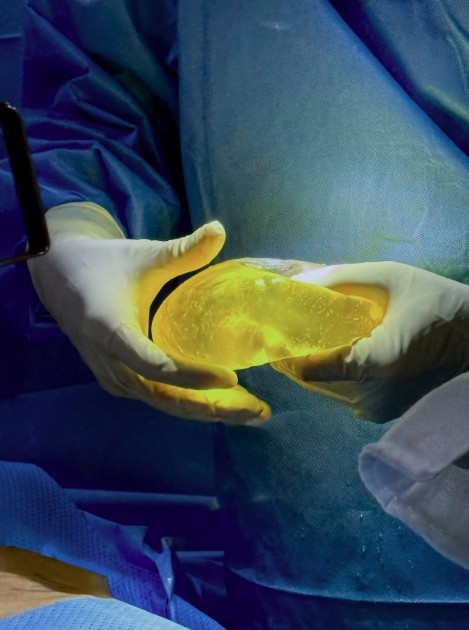Should you stop taking supplements before breast augmentation surgery?
VOV.VN - The use of dietary supplements and collagen in the preoperative period carries several risks that may directly affect blood coagulation, hemostasis, and surgical technique.
Complications from supplement use in cosmetic surgery are comparable to those seen in pathological or emergency surgeries. Prolonged and excessive use of dietary supplements may interfere with the surgical process and delay postoperative wound healing. Some commonly observed complications include:
- Intraoperative dissection and hemostasis challenges for the surgeon: Modern collagen-based supplements often contain additional ingredients such as hyaluronic acid, vitamin C, or glutathione — all of which have strong water-retention properties. Excessive water accumulation in tissues leads to edema, tissue laxity, and poor anatomical delineation, making surgical dissection more difficult and increasing the risk of diffuse bleeding.
When soft tissue retains excessive water over time, several surgical issues can arise: Tissue edema and blurred anatomical planes hinder precise dissection. Increased capillary permeability can result in diffuse oozing that is difficult to identify and control. There is also an elevated risk of postoperative seroma or hematoma, which may prolong recovery.
- Difficulties in breast augmentation surgery with patients who use dietary supplements, Dr. Ho Cao Vu stated: “The use of the Ultrasonic surgical scalpel in breast augmentation, mastopexy, and abdominoplasty offers the advantage of sensing tissue moisture levels, whether dry or wet, to optimize cutting, sealing, and coagulation efficiency. It helps reduce the risk of intraoperative and postoperative bleeding, minimizes tissue damage, and lowers the chance of thermal injury. However, in cases where patients have been using dietary supplements long-term, tissues tend to retain more water and become lax, which creates challenges for the surgeon during dissection and implant pocket creation.”
The surgeon further shared the following challenges encountered during surgery in cases of water-retentive soft tissue:
- Wet tissue increases the risk of bleeding
- Lax tissue makes hemostasis more difficult for the surgeon
- Higher risk of fluid accumulation. If the surgeon fails to assess tissue hydration and laxity and plan an appropriate surgical and postoperative approach, the risk of seroma increases
- Patients may require additional medications to suppress fluid secretion in the pocket after wound closure
Dr. Ho Cao Vu recommends that patients stop taking dietary supplements at least two weeks prior to breast augmentation surgery in particular, and cosmetic surgery in general (especially for procedures involving vascular skin rejuvenation of the face).
Caution is advised with foods and supplements containing ingredients that may affect bleeding, coagulation, or interact with anesthetic agents.
It is important that patients have a direct and complete discussion with their surgeon and anesthesiologist regarding all dietary supplements they have used or are currently using, including product information, duration, and dosage. This allows the medical team to determine necessary advanced testing, anesthetic medications, surgical techniques, and postoperative care protocols to accelerate wound healing.
Many ingredients in dietary supplements such as garlic, ginkgo biloba, turmeric, or echinacea have been shown to increase bleeding risk or interact with anticoagulant drugs, even when standard coagulation values are within the normal range.
In addition, taking collagen, which has strong water-retention properties, may lead to tissue edema and connective tissue laxity, making dissection and bleeding control during surgery more complex.
Therefore, to ensure surgical safety and reduce the risk of complications, experts recommend the following:
Discontinue all dietary supplements at least 2 weeks before surgery.
During the pre-anesthesia consultation, patients should fully disclose all supplements they are currently taking, including non-drug products and over-the-counter items
Proactively identifying and discontinuing these risk factors in a timely manner is an important step to protect patient safety during surgical interventions and to support effective postoperative recovery.






